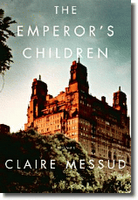To mark the fifth anniversary of 9/11, Slate asked novelists, artists, journalists, and other thoughtful people a question: What work of art or literature has helped you make sense of the attacks and the world after them?A few of the respondents cited poems, Hanif Kureishi named his own film (My Son the Fanatic), the novelist Gish Jen found some consolation in a Brancusi exhibit, and Harold Bloom has "seen absolutely nothing adequate to the event."
It is difficult to know how serious one should regard other proposed works ("the best 9/11 movie is probably Snakes on a Plane," wrote Tom Ricks, author of Fiasco: The American Military Adventure in Iraq).

Here are a few of the entries that cited novels:
Christopher Benfey, Slate art critic
Click here to read all the entries.I was spooked to find in Gravity's Rainbow so many anticipations of 9/11, from its familiar opening words ("A screaming comes across the sky") to stray details ("But then last September the rockets came"), and, on the last page, a reference to "the Light that brought the Towers low." Back in 1973, Pynchon gave us our great paranoid dream of a world ruled by "The Firm," where "there is a Pearl Harbor every morning, smashing invisibly from the sky." But he also offers some refuge in the quiet precincts of Emily Dickinson's poetry, invoked more than once, and in the sheer imaginative arc of his onrushing book.
Pankaj Mishra, author, Temptations of the West: How to Be Modern in India, Pakistan, Tibet, and Beyond
So much of our intellectual energy since 9/11 has been spent on understanding the so-called Muslim world. However, no literary genre has seemed more capable of illuminating its complex emotional reality than fiction. I found Nadeem Aslam's novel Maps for Lost Lovers to be particularly insightful. Describing with exceptional fidelity the inner lives of a devout Muslim woman, her secular husband, and their rebellious children in a British town, Aslam lays bare the often painful ways in which people negotiate their way out of the security of tradition, and then struggle to realize the promise of personal fulfillment held out by modernity.
Jane Smiley, author, Good FaithIt happens that I wrote a whole book about this very topic—Thirteen Ways of Looking at the Novel. My initial response to 9/11 was to try to get as far away from it as possible, so I read the Seidensticker
translation of The Tale of Genji, written in 1004, generally considered to be the first "novel." However, since The Tale of Genji was written at a time when the Japanese were much influenced by Buddhist thought, the great theme of the novel is the ephemerality of life, so the characters are always reflecting on the fleeting nature of all things that seem real and permanent, which of course was quite pertinent to 9/11. I found the paradox of reading a 1,000-year-old novel that repeatedly explores these ideas and images quite comforting and salutary, and then went on to read other old books from different parts of the world (Iceland, Italy, France) that looked at mortality from sometimes wildly different perspectives. Somehow, reading about ancient feuds, the Black Death, and the cruelties of the Reformation and Counter-Reformation turned out to be life-affirming after all.
Sam Tanenhaus, editor, New York Times Book ReviewTwo exceptional novels come to mind. First, Orhan Pamuk's Snow, which illuminates the world of political Islam in much the way Dostoevsky and Conrad illuminated the revolutionary-terrorist politics of their eras. Second, Claire Messud's The Emperor's Children, which captures, in all its comfortable fatuity, the New York City that, in retrospect, seemed poised for disaster.
--Marshal Zeringue






